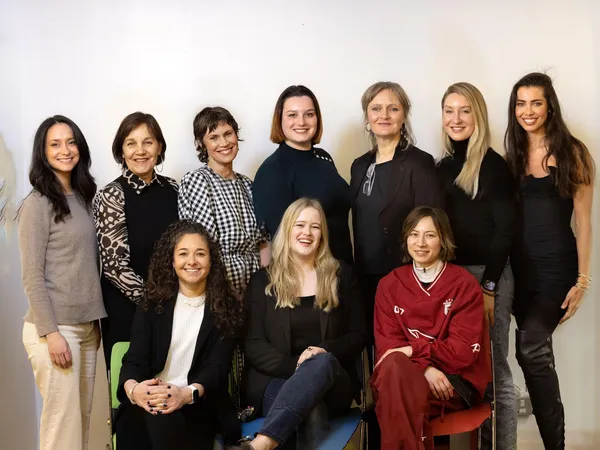 |
| Women In Action cohort 2025 Photo: Simon Annand |
Action movies have come a long way in the last few decades in terms of gender balance. We increasingly see women in leading roles, and they’re getting a wider range of things to do there – yet there is still a notable shortage of women behind the camera. That’s why UK studio Action Xtreme has developed a new programme called Women into Action. It’s designed to nurture talents of all kinds – stars, stunt performers, directors and producers – to help women break through.
The programme, now entering its first year, is led by studio co-founder Chee Keong Cheung – best known as the writer/director/producer of Redcon-1 – and head of production Ioanna Karavela, both of whom joined me to explain what’s involved and why it’s so important.
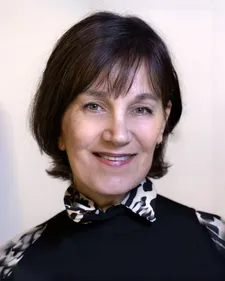 |
| Anya Camillieri Photo: Simon Annand |
Chee begins by talking about his own experiences when he first entered the industry in the early 2000s. “I had a lot of challenges and struggles in terms of routes in, in terms of learning about financing and production and distribution,” he recalls. “I was fortunate to have some really great industry mentors who helped me and guided me in navigating through the process. One produced in particular, Tim Hampton, who was the former VP of 20th Century Fox. He’s sadly passed away, but he worked on some amazing films like Aliens and Chariots Of Fire, and that was really fascinating for me to learn about.
“I feel the industry can sometimes work in silo, in terms of individuals. Having worked with some amazing action talent, I just fell into this film, which was called Bad Day At The Office. It’s a point of view action film. We sometimes spend a lot of time waiting for the next role or the next project to happen. One of the things in my career, I guess, is I tried to drive forwards and try and make things happen and then find ways – whether it's been distribution or production – of getting things made.
“The Women in Action programme really evolved from identifying some amazing talent and feeling that they had this skill set, whether it was to be a director or writer or having potential to become a producer, and giving them a more 360° view on the lessons that I've learned and experiences, both the successes and the failures. So that was the mission, the foundation of the programme.”
They’re also launching a master’s degree course, after visiting a number of universities to examine ways in which they might bridge the gap between education and industry. Among other things, it will give participants the chance to make a microfeature.
I ask Ioanna if she thinks that, as action has traditionally been seen as a men’s genre and building up a film crew depends a lot on personal connections, women are still disadvantaged because they’re not so much part of genre networks.
“Action films were always something that I really liked when I went to film school,” she says. “It was a genre that I grew up with, if you like. And you're correct, it's not a natural habitat for women working in the industry, but it's maybe also them not feeling that they can forge those friendships, you know? I mean, it's 50/50. Sometimes you can actually find that the spaces can be welcoming. But yes, naturally, women don't feel that they belong there. I certainly didn't think I belonged there from a production point of view.
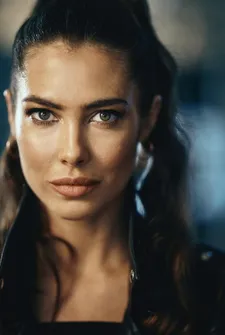 |
| Eloise Lovell Anderson Photo: Simon Annand |
“We go back 20 years, me and Chee. working together, and yes, the space was very welcoming when we started out on actual films, but I didn't really think that that would be so possible. I guess what we're trying to do with this program is to work on both sides of the coin. Yes, it's true, there is a gap of women having these relationships or being able to find themselves in spaces where action coordinators exist, fight choreographers and others, so that they feel confident about their ideas and then they can develop them. But at the same time, we want them to have a bit more courage to do that anyway. I don't know if there was ever a space for a woman, ever, that they didn’t have to go claim in order to occupy it.”
The UK produces quite a lot of action cinema, but it's not really known for action internationally. We don't seem to have the success with our action films that some other countries do. Can bringing in new creative voices help with that?
“I think the action space has been very male dominated, behind camera and in front of camera,” says Chee. “here’s been a positive shift in recent years in terms of more opportunity opening up, more female-led action films. But also, there's a difference in terms of how one approaches action and that is in terms of two men having a fight versus a woman having a fight versus a guy. It's a different kind of dance, shall we say? In terms of physicality and scale and power. So I think there's various different factors in terms of how you then start putting creatives together and generating different kinds of ideas.
“Within this action space there's a tremendous amount of creativity to be able to explore. Early on with my action films, what I found was we have some incredible action talent in the UK, some amazing, incredible people, and I’m really fortunate to have the opportunity to work with them. But we have a lot of talent that then moves on – on to a Bond film, to an Avengers film. It’s great, and incredibly important in terms of working on those kinds of productions, but it's different level of nurturing, I think. They're working on these films versus the individual voices of those kinds of creatives and stories they want to tell.
“Within that smaller indie action space, there's less of that in the UK in terms of opportunities. It's more talent working on bigger productions which come on from overseas. One of the things early on in my career when I was fortunate to work on some action films was about finding incredible talent in clubs and gyms, people who loved a Jackie Chan film or running up walls and had this amazing ability. And their love came first through their love of martial arts, their love of action films and then recreating them. I think perhaps in the UK, because those aren't as the kinds of films that the industry has focused on, that space wasn't necessarily fully nurtured.
“Action and sometimes horror are perceived as genres that are fun to watch but maybe not really filmmaking. There's an element of people looking down upon it. There's sometimes that kind of stigma that people have to battle against. Whereas I think in the US there's a lot more action content which has been created – or even if looking at India, Bollywood. That seems interesting to me.”
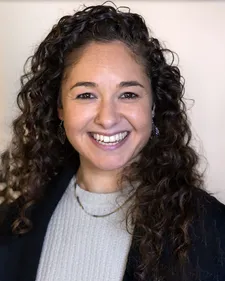 |
| Kate Lane Photo: Simon Annand |
We talk about the applicants for the first Women In Action programme.
“It's a real mix of action performers, writers, directors and producers,” says Chee. “It's a 12 month mentoring program where what we wanted to do was find ways that we could create a bespoke program for each individual, so it was about them looking at their work. So part of the kind of the criteria was about studying their application in terms of how we could help them. It was kind of shame because there were a lot that we really wanted to help, and we were going to look at six to eight people. We ended up taking on board ten candidates.
“I think what stood out was the kind of people who had transferable skills. One individual who we're working with is working in the kids’ space, for example, so there's a transition there into writing young adult action-orientated material. We have some directors who are interested in learning more about action and shooting action scenes; and others who are action performers who we want to teach about producing. We have one who is working in a women-led parkour group, and we're looking at how we can help build their profile.”
“We are a team of three and we all went through all of the applications and made our own shortlists through a certain set of criteria,” says Ioanna. “Then we discussed quite extensively how we arrived at our selections. The final decision was a combination of things. And in the end, it was hard for us because we would have liked to also take more people. But it was quite crucial to ensure that the 12 months will be meaningful to them. We were looking for individuals that we felt we can actually make a change with, within the space of the year, with tangible results.
“At the same time, it wasn't that everybody had to be experienced, but they had to be at the right moment in their lives, career wise, where what they wanted to achieve could be achievable with us involved. So that at the end they could come away not off the back of a passive programme where they just learned a lot of information but with tools, so they can actually apply them and shoot something, develop a script or collaborate with each other and make something. So they no longer talk about action, but they can demonstrate that they actually had experience in action filmmaking.”
I ask her what advice she has for girls or young women out there who are just starting to think about careers, and who think that this is something that they'd like to go into.
“Ignore the noise,” she says, decisively. “If you like action filmmaking, pursue it. There is a change and I think that we have to support it. And don't be afraid to ask to collaborate in spaces where maybe you are the only one in the room. I know this is hard, but I think that girls often want to see that someone like them is there before they go. And that's really difficult. But there is a space. Stories are changing. Audiences are looking beyond what's traditionally expected of an action film. It's an unexplored space. I think women should embrace it.”
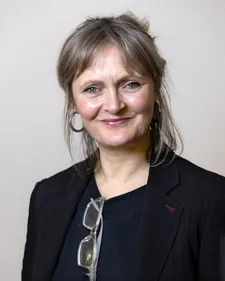 |
| Catherine Williams Photo: Simon Annand |
“We've been really, really inspired by the amount of people who did apply,” says Chee. “Off the back of that interest, we're actually going to be building a networking opportunity for everyone, for those who weren't able to make it as well. But I think what I've kind of been really inspired about, with the candidates that we have, is this ability of breaking down barriers, making things, getting things done. I guess my view is we're just helping to equip them with a little bit of knowledge and a bit of guidance and steering. Fundamentally the work comes from them, so really what we're doing is opening some doors, championing them. But what's been really interesting is the creativity is really coming from them.
“I think filmmaking now has become more and more accessible, with things like GoPros and iPhones, and I think it's just about going and making something. Don't be afraid to put yourself out there. The more you do, the better you get. And I think it is just about not giving up. It is challenging, particularly action. The action space is very collaborative. Even myself as director or producer on the film, I’m only as good as my team. It's a very technical process, but the creativity is paramount.
“The hope is that people will hear a little bit about what Action Xtreme does and just go and make something and hopefully share it with us as well . And I think for us, if we can create more conversations and more discussions and panel talks and share our experiences, it can only benefit the industry.”





















